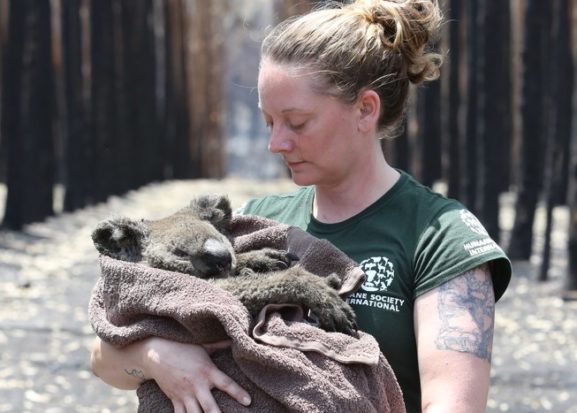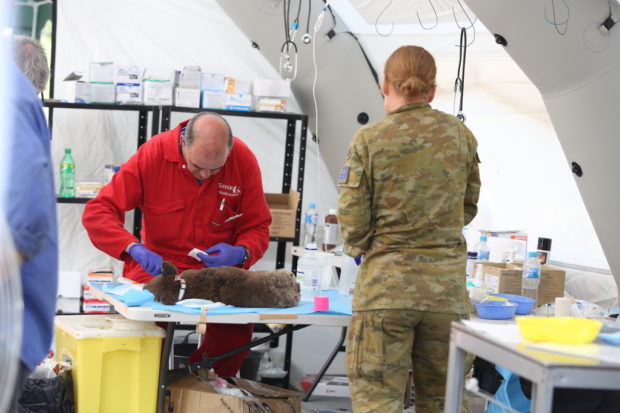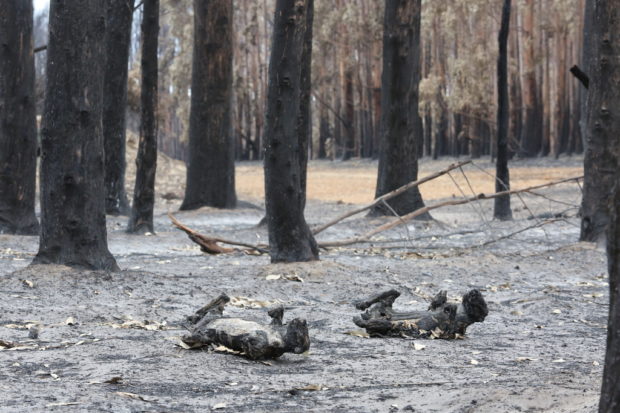
Before the fires, Kangaroo Island was home to an estimated 46,000 koalas; it is now estimated that only 9,000 remain. Above, HSI’s Kelly Donithan with a rescued koala.
Photo by Jo-Anna Robinson/AP Images for HSI
The Humane Society International rescue team’s reports from Australia’s Kangaroo Island describe an “apocalyptic” scene. Once a critical wildlife habitat celebrated the world over for its pristine wilderness, Kangaroo Island has been ravaged by the recent bushfires, with at least 600 square miles of land destroyed. I traveled to the island on assignment with HSI in 2000, and was moved to see the kangaroos and koalas thriving in the wild. Sadly, these memories have now been replaced by images of scorched landscapes and terrible animal suffering and loss. I’m proud of our expert disaster responders who are giving their all to help animals who have survived the catastrophe.
Our rescuers have been plucking injured and traumatized koalas, kangaroos, possums and other survivors from scorched landscapes that have no food or water, and bringing them to local wildlife rehabilitation centers for veterinary treatment. The loss involved is intense and heartbreaking. Before the fires, Kangaroo Island was home to an estimated 46,000 koalas; it is now estimated that only 9,000 remain. The death toll continues to mount for other native animals, including kangaroos, wallabies, bandicoots, brushtail possums and echidnas. In addition to the damage done to national parks and wildlife on the island, new estimates indicate that over 100,000 sheep and other livestock held on the island have been killed.

Our rescuers have been plucking injured and traumatized koalas, kangaroos, possums and other survivors from scorched landscapes that have no food or water, and bringing them to local wildlife rehabilitation centers for veterinary treatment. Photo by Jo-Anna Robinson/AP Images for HSI
For every few animal survivors, there are thousands who are dead. This week, our team came across a water hole inside a burnt plantation while searching for any living animals., “There were bodies floating in it of animals who had finally succumbed to the lack of nourishment,” Kelly Donithan, HSI’s senior specialist for disaster operations, wrote. The rescuers found two adult koalas at the water’s edge, curled up, one in a tree nearby, and a small joey curled up on the ground. One of the adult koalas had a tiny joey in her pouch who had died. Responders transported the animals to the wildlife rehabilitation center and returned for more.
Some animals we’ve found are so severely injured that there is no hope for survival. A wallaby our team rescued in the same area the following day was suffering from severe burns to all four paws—burns so bad that his feet would eventually fall off and cause a long painful death. “He was put to sleep humanely and we’re grateful we could help end that suffering,” Kelly wrote.
The animals are understandably frightened and many resist rescue. Our team saw some koalas high up in the trees, and for animals like these we are setting up water and food stations. We’ll also be keeping an eye on the animals in case they get weaker and begin to climb down to the ground, so we can bring them in.

For every few animal survivors, there are thousands who are dead. Photo by Jo-Anna Robinson/AP Images for HSI
There are similar reports from our other team members who continue to comb through the landscape for animal survivors. Remarkably, some of the animals appear unscathed, but even they may need to be brought to sanctuary temporarily until habitat regenerates to provide them with sustainable sources of food and water.
It is estimated that more than a billion animals have been killed in Australia so far by the wildfires, which, scientists say, was made much worse by climate change. It’s likely that entire species have been wiped out forever. We cannot let this continue.
The United Nations has warned that a millions species are threatened with extinction in part due to climate change, and we will continue to work here in the United States and globally to mitigate this threat. HSI is also working internationally to help governments adapt to the impact of climate change on animals and humans.
With Australia still burning, we are scaling up our rescue efforts there. We’re sending additional wildlife rescue experts from our offices in the United States, India and Costa Rica to assist the teams already on the ground, and I will continue to keep you updated on their work. This is going to be a long-term recovery effort and we need your help urgently, so we can help as many animals as possible. Please donate now to our Disaster Relief Fund to assist our work in Australia and elsewhere.
Support our animal rescue fund
The post HSI responders saving koalas, kangaroos and other animals in wildfire-ravaged Australia appeared first on A Humane World.
Enviroshop is maintained by dedicated NetSys Interactive Inc. owners & employees who generously contribute their time to maintenance & editing, web design, custom programming, & website hosting for Enviroshop.
